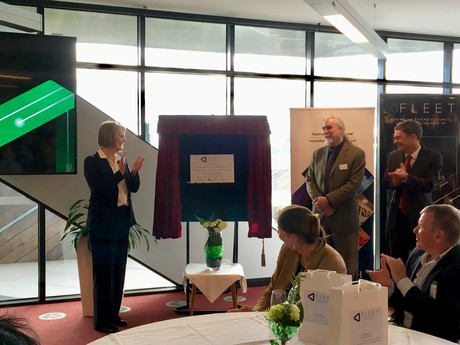ARC centre to tackle the growing energy costs of computing

With the global appetite for computing currently burning more than 5% of global electricity — a figure which is expected to double each decade — a new Australian Research Council Centre of Excellence is seeking new solutions to an ever-growing problem.
Opened this week at Monash University, the ARC Centre of Excellence in Future Low-Energy Electronics Technologies (FLEET) is a collaboration of more than 100 researchers at seven Australian universities and 13 Australian and international science organisations. The $33.4 million centre will use the emerging science of topological materials and atomically thin 2D materials to create ultralow-energy electronics that achieve zero, or near-zero, wasted dissipation of energy.
For the past 50 years, our ever increasing need for more computing was satisfied by improvements in computing technology, which produced ever smaller, ever more efficient chips — a phenomenon known as ‘Moore’s law’. However, as we hit limits of basic physics and economy, Moore’s law is winding down.
“When we exhaust further efficiencies in silicon technology and data-centre management, energy will become the limiting factor for any further computation growth,” said Professor Michael Fuhrer, director of the newly opened FLEET.

Already, information and communications technology is responsible for 5–8% of global electricity use, with most of that energy consumption ‘hidden’ out of sight in vast, factory-sized data centres (or server farms). In fact, each smartphone is now responsible for burning more electricity than a household fridge. Continuing the IT revolution means finding a new electronics technology that uses much less energy.
“FLEET places Australia at the forefront of exciting new scientific research — building capacity for advanced electronics research and training today’s workforce for the electronics industry of the future,” said Professor Fuhrer.
The centre of excellence was opened by ARC Chief Executive Officer Professor Sue Thomas with Monash Provost and Senior Vice President Professor Marc Parlange and Professor Fuhrer. Participating universities include Monash University, the University of New South Wales, the Australian National University, RMIT University, Swinburne University of Technology, The University of Queensland and the University of Wollongong.
Originally published here.
Electronex Sydney a major success
More than 1000 trade visitors and delegates have attended the Electronics Design & Assembly...
Gartner: Global AI chips revenue to grow 33% in 2024
Gartner has forecast that the revenue from AI semiconductors globally will total $71 billion in...
Electronex Expo returns to Sydney for 2024
Electronex — the Electronics Design and Assembly Expo will return to Sydney in 2024,...





